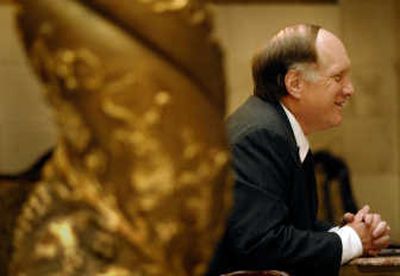STCU tailors its service

After nearly 17 years of working for Spokane Teachers Credit Union, Steve Dahlstrom understands the local market. People here are honest folks with decent credit ratings who, by and large, pay their bills on time, the credit union CEO said. Like the rest of the nation, they could do a better job of saving. Dahlstrom estimates that 60 percent of STCU’s members don’t have savings accounts, adding, “It’s everybody. I’ve got retirees who don’t have a cent in savings either.”
To inspire members to set aside money for a rainy day, the credit union is offering a savings account that pays 6 percent interest on the first $500. It’s an expensive move for a credit union, he said, but the board of directors agreed that encouraging members to plan for the future is worth the investment.
Tailoring services to meet members’ needs is a hallmark of credit unions, which function as cooperative financial institutions. For more than four years, STCU’s mix of services and products has earned it a ranking as the third-largest Washington-chartered credit union, according to the Washington Department of Financial Institutions.
Since 2003, assets have increased by $335 million to $885 million. In the past three years deposits grew by about 9 percent annually, STCU records show. With 11 branches, including two recently opened in North Idaho, and one slated for Liberty Lake, STCU is poised to continue growing.
“There’s a fine line between trying to balance the needs of the current members and trying to attract new members,” Dahlstrom said.
Not only is Spokane a good place to do business, and a growing community, Dahlstrom said, the quality of competition within the lending industry is solid. STCU competes with other locally based credit unions including Global, Horizon and Numerica, which is in the processing of opening a new Coeur d’Alene branch.
Numerica, formerly Spokane Railway Credit Union, and STCU are neck-and-neck for membership; both claim about 70,000 members on their Web sites.
With $698 million in assets, Numerica is currently fifth in the state for assets, according to DFI records.
Linda Jekel, director of credit unions for DFI, said the performance of the two credit unions speaks to the strength and growth in Eastern Washington.
Dahlstrom characterizes the back-and-forth competition between the co-ops, which have shared access for members, as friendly “cooperation.”
Because each credit union has a volunteer board representing the needs of the members, types of products and services vary. For example, STCU offers student loans, while some credit unions choose to forgo that product in favor of other loans.
The top-selling products also differ. Mortgages make up 35 percent of STCU’s business, while auto loans make up 33 percent of Numerica’s.
“We’re not trying to sell products to our members. What we look at are the types of people who are our members and what types of products they need,” Dahlstrom said.
John Annaloro, president and CEO of Washington Credit Union League, a nonprofit trade association, said membership in credit unions is growing slightly faster than the population in Washington, which has residents belonging to 2,100 different credit unions based throughout the country. Competition among credit unions results in better deals for consumers, he said.
As a person who oversees the 77 credit unions chartered in Washington state, Jekel attributes STCU’s performance to solid branding, public education, a quality board of directors and great inter-staff communication from top to bottom. The company has 325 employees.
Although STCU was started in 1934 by a teacher for teachers, the credit union is increasingly marketing its services to non-educators and younger adults. In 2003, STCU added a business division, which made $68 million in loans last year. Business loans make up 9.5 percent of STCU’s business, and Dahlstrom said most of the commercial loans are $500,000 or less.
The 54-year-old CEO believes in the personal touch and recently worked out a solution with a member who had been denied a loan for a pickup truck.
Although she was receiving some money from other sources, her only documented income was $400 a month in social security. Plus, the woman had no savings.
Payments for the loan would total $80 a month, so Dahlstrom told the member if she could put $80 a month into savings for five straight months, she could get the loan.
The point, the CEO said, was to get her in the habit of making payments and help her learn to save money. She made the deposits and eventually got her truck.